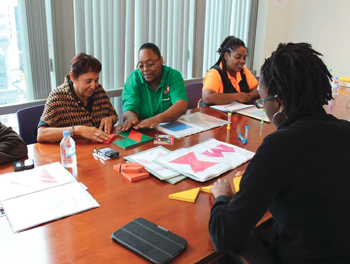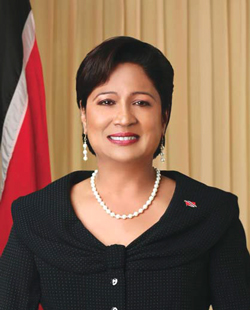The changing face of Caribbean migration
By Jewel Fraser | Last updated: Oct 2, 2014 - 5:44:37 PMWhat's your opinion on this article?

People participating in a health and wellness conference in Trinidad. Photo: Trinidad and Tobago Ministry of Tourism Facebook.
|
As a Guyanese migrant living in Trinidad, the 35-year-old is one of thousands of Guyanese to have taken the plunge over the past decade, since the free movement clause of the CARICOM Single Market and Economy (CSME) regime granted skilled persons the right to move and work freely throughout the region.
According to a recent report, Trinidad and Tobago hosts 35.4 percent of migrants in the region. The United Nations’ “Trends in International Migrant Stock: The 2013 Revision” states that Latin America and the Caribbean host a total migrant stock of 8.5 million people.
Women make up 51.6 percent of migrants in the Caribbean, according to Organization for Economic Cooperation and Development 2013 figures.

The Honourable Persad-Bissessar, Prime Minister of Trinidad and Tobago. First Female Prime Minister of Trinidad and Tobago elected into office in 2010. Photo: Trinidad and Tobago Ministry of Tourism Facebook.
|
A 2013 report by the ACP Observatory on Migration states, “Guyanese migrants in Trinidad and Tobago faced unfavorable opinions in the social psyche and this could translate into tacit and other forms of discrimination.”
The report, prepared by the regional consulting firm Kairi Consultants, goes on to state that migrants from Guyana were “assumed to be menial laborers or undocumented workers.”
Guyana is one of the poorest countries in the CARICOM region, with a gross domestic product per capita of $6,053 in 2011. This stands in contrast to Trinidad and Tobago’s per-capita GDP of $29,000, according to the 2010-2011 UN Human Development Report.
But Ms. Osman’s background is not one of destitution. She applied for a CARICOM skills certificate in 2005, having completed a postgraduate diploma in Arts and Cultural Enterprise Management at the St. Augustine campus of the University of the West Indies in Trinidad.
“I considered myself an artist, which is why I came to study here … and I thought it a great stepping stone in my realizing that dream of being a singer, songwriter, performer …. Trinidad seems to be, in relation to where I came from, a more fertile ground for [what] I wanted to do,” she said.
Ms. Osman has her own band and performs as a jazz singer at nightspots in Trinidad and Tobago. During the day, she works as a speechwriter for Trinidad and Tobago’s Minister of Public Utilities.
Still, she misses the support network that her parents’ substantial contacts would have provided her in Guyana, and she acknowledges that her standard of living is also probably lower than it would have been if she were back home. But, she said, the move was necessary.
Ms. Osman’s story is in line with the findings of a 2010 CARICOM Secretariat report to “assess the impact of free movement of persons and other forms of migration on member states,” which found: “Although, historically it is persons at the lower end of the socioeconomic scale in Caribbean society that have been the main movers, the CSME has to date facilitated the movement of those at the upper end, the educated elite in the region.”
Limited educational opportunities also explain the wave of migration out of Guyana, a finding borne out by the experience of Miranda La Rose, a senior reporter with one of Trinidad and Tobago’s leading newspapers, Newsday, who holds a bachelor’s degree in political science.
“I came here with the intention of working to help fund [my daughter’s] studies,” Ms. La Rose told IPS. “I was working for a fairly good salary in Guyana. My objective [in moving to Trinidad] was to improve my children’s education.”
She said the move to Trinidad was painless, since she was granted her CARICOM skills certificate within three weeks of applying, and she has amassed a circle of friends in Trinidad that compensates for the family she left behind in Guyana.
But not all stories of migration are happy ones. Some, like Alisa Collymore, represent the pains experienced by those with limited skills and qualifications.
Ms. Collymore, who now works as a nursing assistant with a family in Trinidad, applied for a CARICOM skills certificate under the entertainer category, because she had experience in songwriting and performing in Guyana.
However, she holds no tertiary qualifications in the field and only completed her secondary school education after she became an adult.
The Trinidadian authorities declined to grant her the CARICOM skills certificate and she has to apply for a renewal of her work permit every six months.
She said, “The treatment you get [is not what you] expected … and the hand of brotherhood is not really extended. You feel like you are an outsider.”
Nevertheless, she said, the move has brought economic benefits. As a single, divorced, mother of three, she had struggled financially in Guyana. Since moving to Trinidad, her financial situation has improved, she said.
Though some studies have found negative impacts of the free skills movement on source countries, many are finding in the CARICOM scheme a chance to start a new—and often better—life.
This story originally appeared in a special edition TerraViva.
INSIDE STORIES AND REVIEWS
-
-
About Harriett ... and the Negro Hollywood Road Show
By Rabiah Muhammad, Guest Columnist » Full Story -
Skepticism greets Jay-Z, NFL talk of inspiring change
By Bryan 18X Crawford and Richard B. Muhammad The Final Call Newspaper @TheFinalCall » Full Story -
The painful problem of Black girls and suicide
By Charlene Muhammad -National Correspondent- » Full Story -
Exploitation of Innocence - Report: Perceptions, policies hurting Black girls
By Charlene Muhammad -National Correspondent- » Full Story -
Big Ballin: Big ideas fuel a father’s Big Baller Brand and brash business sense
By Bryan Crawford -Contributing Writer- » Full Story






 Click Here Stay Connected!
Click Here Stay Connected!








